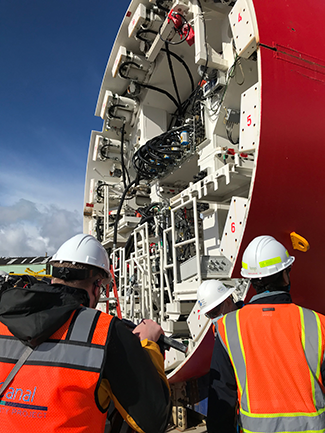King County will save more than $80 million for critical water quality projects with low-interest loans
Summary
King County Wastewater Treatment Division will receive $165.3 million in low-interest loans awarded by the state Department of Ecology for two critical projects that protect water quality. The loans will save ratepayers $83.5 million in interest costs.
Story

King County Wastewater Treatment Division will save $83.5 million by qualifying for low-interest loans awarded by the state Department of Ecology that will help fund two critical water quality projects.
The King County Council recently approved the loan agreement, which will provide the Wastewater Treatment Division with $165.3 million for a water quality project along the Lake Washington Ship Canal and financing the new Georgetown Wet Weather Treatment Station, both of which will reduce stormwater pollution.
“These investments are critical to a clean and healthy Puget Sound – now and in the future,” said Wastewater Treatment Division Director Kamuron Gurol. “Our strong track record in financial management allows us to secure excellent financing options including these low-interest loans. This helps get the most mileage we can out of these projects while lowering the burden on ratepayers.”
The Department of Ecology’s Clean Water State Revolving Fund loans apply to two projects:
- The Ship Canal Water Quality Project, a partnership with Seattle Public Utilities that will prevent an average of 75 million gallons of polluted stormwater and wastewater from flowing into the Lake Washington Ship Canal, Salmon Bay, and Lake Union each year.
- The Georgetown Wet Weather Treatment Station, which King County began operating in late 2022 and now treats up to 70 million gallons of combined stormwater and wastewater per day during heavy storms to better protect the Duwamish River and Puget Sound.
Polluted stormwater – runoff that occurs during heavy rainfall – is considered one of the biggest threats to water quality today in King County. It carries toxics – motor oil, metals, pesticides, fertilizer, pet waste, and more – directly into streams, rivers, and Puget Sound. It is contributing to the dramatic decline in native salmon and is threatening the survival of southern resident orcas.
Both projects advance King County’s Strategic Climate Action Plan to prepare the region for climate impacts and the Wastewater Treatment Division’s strategy to reduce and control combined sewer overflows. They are in addition to other projects that are enhancing the region’s wastewater system, making it more reliable and resilient to climate impacts. The Wastewater Treatment Division recently started a decade of improvements at West Point Treatment Plant that will replace pumps and pipes, make seismic upgrades, and provide crews with a more reliable power supply.
Securing low-interest loans is one of several ways the Wastewater Treatment Division minimizes the impacts to ratepayers in addition to careful project planning and cost reduction measures.
King County’s Wastewater Treatment Division protects public health and enhances the environment by collecting and treating wastewater while recycling valuable resources for the Puget Sound region. The division provides wastewater treatment services to 18 cities, 15 local sewer districts, and the Muckleshoot Tribe, including nearly 2 million residents across a 420-square-mile area in King, Snohomish and Pierce counties.
Relevant links
- Ship Canal Water Quality Project
- Georgetown Wet Weather Treatment Station
- Reducing stormwater pollution, the growing threat to water quality in King County
Quotes
These investments are critical to a clean and healthy Puget Sound – now and in the future. Our strong track record in financial management allows us to secure excellent financing options including these low-interest loans. This helps get the most mileage we can out of these projects while lowering the burden on ratepayers.
For more information, contact:
Marie Fiore, Wastewater Treatment Division, 206-263-0284

 Translate
Translate